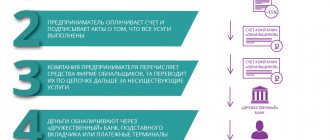ST 174 of the Criminal Code of the Russian Federation.
1. Carrying out financial transactions and other transactions with funds or other property, knowingly acquired by other persons by criminal means, in order to give legal form to the possession, use and disposal of said funds or other property - shall be punishable by a fine in the amount of up to one hundred twenty thousand rubles or the amount of wages or other income of the convicted person for a period of up to one year.
2. The same act, committed on a large scale, is punishable by a fine in the amount of up to two hundred thousand rubles, or in the amount of the wages or other income of the convicted person for a period of one to two years, or by forced labor for a term of up to two years, or by imprisonment. for a term of up to two years with a fine in the amount of up to fifty thousand rubles or in the amount of wages or other income of the convicted person for a period of up to three months, or without it.
3. Acts provided for in part one or two of this article, committed: a) by a group of persons by prior conspiracy; b) by a person using his official position - is punishable by forced labor for a term of up to three years with or without restriction of freedom for a term of up to two years and with deprivation of the right to hold certain positions or engage in certain activities for a term of up to three years or without it, or by deprivation freedom for a term of up to five years with a fine in the amount of up to five hundred thousand rubles or in the amount of wages or other income of the convicted person for a period of up to three years or without it, with or without restriction of freedom for a term of up to two years and with deprivation of the right to hold certain positions or engage in certain activities for a period of up to three years or without it.
4. Acts provided for in part one or three of this article, committed: a) by an organized group; b) on an especially large scale - is punishable by forced labor for a term of up to five years with or without restriction of freedom for a term of up to two years and with deprivation of the right to hold certain positions or engage in certain activities for a term of up to three years or without it, or by imprisonment for a term of up to seven years with a fine in the amount of up to one million rubles or in the amount of the wages or other income of the convicted person for a period of up to five years or without it, with or without restriction of freedom for a term of up to two years and with deprivation of the right to hold certain positions or engage in certain activities for a period of up to five years or without it.
Note : In this article and Article 174.1 of this Code, financial transactions and other transactions with funds or other property carried out on a large scale are recognized as financial transactions and other transactions with funds or other property carried out in an amount exceeding one million five hundred thousand rubles, and in an especially large amount - six million rubles.
Commentary to Art. 174 Criminal Code
1. The subject of the crime is cash, securities in Russian and foreign currency, other movable and immovable property acquired knowingly by criminal means, property rights.
Knowingly means that the subject knows for certain that he is using funds or other property that were received by another person in the form of proceeds of criminal activity.
The fact of criminal acquisition of funds or other property must be established. This can be done both during and before the trial considering a criminal case on laundering criminal proceeds (clauses 4 - 5 of the Resolution of the Plenum of the Supreme Court of the Russian Federation dated July 7, 2015 No. 32 “On judicial practice in cases of legalization (laundering) of money funds or other property acquired by criminal means and on the acquisition or sale of property known to have been obtained by criminal means”).
2. A financial transaction as a transaction differs from other transactions only in that it is associated with the circulation of money, securities and payment documents through banks or other credit organizations.
Other transactions with money or property constitute the completion of any civil transactions (donation, barter, purchase and sale, etc.), as well as the creation of the appearance of such transactions.
In Part 1 of Art. 174 of the Criminal Code does not define the minimum value of legalized property, therefore, to bring to criminal liability it is enough to make one financial or other transaction that is not assessed as a minor act (Part 2 of Article 14 of the Criminal Code).
3. The subjective side is characterized by direct intent and a special purpose - giving a lawful appearance to the possession, use and disposal of the specified funds or property.
4. The subject of the crime cannot be a person who participated in the commission of the primary (main) crime, since his actions are covered by Art. 174.1 CC.
5. A person who uses his official position in the legalization (laundering) of funds or other property known to be acquired by criminal means is understood to be an official, an employee, as well as a person performing managerial functions in a commercial or other organization.
Second commentary to Art. 174 of the Criminal Code of the Russian Federation
1. The judicial interpretation of the elements of legalization is given in the Decree of the PVS of the Russian Federation dated July 7, 2015 No. 32 “On judicial practice in cases of legalization (laundering) of funds or other property acquired by criminal means, and on the acquisition or sale of property known to be obtained by criminal means” , with change dated February 26, 2019 (hereinafter referred to as the 2015 resolution).
2. Subject - money or other property acquired by criminal means. According to the explanation of the Plenum of the Supreme Court in 2015, this is not only money or other property, the illegal acquisition of which is a sign of a specific crime (for example, theft, taking a bribe), but also money or other property received as material reward for a crime committed (for example, for murder for hire) or as payment for the sale of items limited in civil circulation. At the same time, based on the provisions of Art. 1 of the Council of Europe Convention on Laundering, Identification, Seizure and Confiscation of Proceeds from Crime and on the Financing of Terrorism of May 16, 2005 and taking into account FATF Recommendation 15, the subject of crimes under Articles 174 and 174.1 of the Criminal Code of the Russian Federation may include monetary funds converted from virtual assets (cryptocurrency) acquired as a result of the commission of a crime (clause 1 of the 2015 resolution).
3. If property acquired by criminal means (as a result of committing a crime) is limited by law in civil circulation and liability for its illegal trafficking is provided for in one of the articles of the Special Part of the Criminal Code (in particular, articles 186, 191, 220, 222, 222.1, 228.1) , then making a transaction with him in order to give legal form to possession, use and disposal should be qualified only under the relevant article as the acquisition or sale of weapons, ammunition, narcotic drugs, etc. without combination with Articles 174 and 174.1 of the Criminal Code. The subsequent commission of financial transactions and transactions with funds received as a result of the transformation of such property (for example, with funds acquired as a result of the sale of a narcotic drug) for these purposes forms the objective side of the crimes provided for in Art. 174 or art. 174.1 of the Criminal Code (clause 2 of the 2015 resolution).
4. When mixing funds or other property that do not have individually defined characteristics, acquired by criminal means (as a result of committing a crime), with homogeneous lawfully acquired property (for example, when funds are credited to a bank account from different sources), the subsequent execution of financial transactions or transactions with such property are subject to qualification under Art. 174 or art. 174.1 of the Criminal Code in an amount corresponding to the amount of money or the value of other property acquired by criminal means (as a result of the commission of a crime) (clause 3 of the 2015 resolution).
5. The court’s conclusion about the criminal nature of the acquisition of property, along with other materials of the criminal case, may be based on: a conviction in a case of a specific crime provided for in one of the articles of the Special Part of the Criminal Code (on the main crime); resolution of the preliminary investigation body to terminate a criminal case (criminal prosecution) for committing the main crime in connection with the death of a person subject to criminal liability, in connection with the person’s failure to reach the age of criminal responsibility, in connection with the expiration of the statute of limitations for criminal prosecution, in cases provided for clause 6, part 1, art. 24 of the Code of Criminal Procedure, in connection with the reconciliation of the parties, as a result of the amnesty act, in connection with active repentance, as well as on the grounds provided for in Art. 28.1 of the Code of Criminal Procedure of the Russian Federation, if the materials of the criminal case contain evidence indicating the existence of an event and the elements of the main crime, and the preliminary investigation body has given it an appropriate assessment, etc. (Clause 4 of the 2015 resolution).
6. It is fundamentally important that the subject of the crime under Art. 174 of the Criminal Code, did not participate in the commission of crimes, the proceeds of which are legalized; they were committed by other persons, but the subject of legalization must be aware of the criminal origin of funds or other property.
7. The objective side is the legalization (laundering) of funds or other property acquired by other persons through criminal means.
Legalization (laundering) of proceeds from crime should be understood as giving legal form to the possession, use or disposal of funds or other property obtained as a result of committing crimes, with the above exceptions.
8. Legalization consists of carrying out financial transactions and other transactions with funds or other property. According to paragraph 6 of the 2015 resolution, financial transactions can be understood as any transactions with funds (cash and non-cash payments, cash transactions, transfer or exchange of funds, exchange of one currency for another, etc.). Transactions may include actions aimed at establishing, changing or terminating civil rights and obligations, as well as creating the appearance of the emergence or transfer of civil rights and obligations. At the same time, according to the meaning of the law, these financial transactions and transactions, known to the guilty person, mask the connection of the legalized property with the criminal source of its origin (the main crime).
Responsibility also arises when committing one financial transaction or transaction with funds or other property acquired by criminal means (as a result of committing a crime), if it is established that such an act was committed with the aim of giving legality to the possession, use and disposal of these funds or other property (for example, concluding a purchase and sale agreement for a real estate property, the criminal acquisition of which is disguised by deliberately forged documents on the ownership of this object) (clause 7 of the 2015 resolution).
9. Crimes under Art. Art. 174 and 174.1 of the Criminal Code, committed through financial transactions should be considered completed from the moment when the person, acting for the purpose specified in these articles, directly used criminally obtained funds to pay for goods or exchange or presented (transferred) to the bank an order to transfer funds and so on. In cases where the above-mentioned crimes were committed through a transaction, they should be considered completed from the moment the guilty person actually fulfills at least part of the obligations or realizes at least part of the rights that arose for him under the transaction (for example, from the moment the guilty person transfers received by him in as a result of committing a crime of funds or other property to the other party to the contract, regardless of whether he received counter-performance under the transaction). If, in order to give a lawful appearance to the possession, use and disposal of funds or other property acquired by criminal means (as a result of committing a crime), only the appearance of concluding a transaction with property is created, while in reality the actual transfer of property is not intended, then a crime , provided for in Art. 174 and 174.1 of the Criminal Code should be considered completed from the moment the agreement is drawn up between the perpetrator and another person (for example, from the moment the agreement on payment for services is signed, which disguises the criminal acquisition of the relevant funds) (clause 8 of the 2015 resolution).
10. The recognition of the crime as completed is not affected by the fact that financial transactions or transactions were carried out in the context of an operational-search activity carried out in accordance with the Federal Law of August 12, 1995 No. 144-FZ “On Operational-Investigative Activities”.
11. The subjective side is characterized by direct intent and a special purpose - to give a legal appearance to the possession, use and disposal of funds or other property.
The purpose of giving legal form to the possession, use and disposal of funds or other property acquired by criminal means (as a result of committing a crime), as a mandatory feature of the crimes provided for in Articles 174 and 174.1 of the Criminal Code of the Russian Federation, should be understood as concealing the criminal origin, location, placement, movement of property or rights to it. This goal can be established on the basis of the factual circumstances of the case, indicating the nature of the financial transactions or transactions performed, as well as other related actions of the guilty person and his accomplices, aimed at concealing the fact of the criminal acquisition of property and ensuring the possibility of its free circulation (clause 10 2015 resolution).
The intent to launder funds or other property acquired through criminal means (as a result of committing a crime) is not evidenced by the disposal of them for personal consumption (purchasing food, essential goods, receiving household services, etc.). Depending on the specific circumstances of the case, the commission of such actions may be qualified under Art. 175 of the Criminal Code or covered by an article of the Special Part of the Criminal Code, which provides for liability for the main crime (clause 11 of the 2015 resolution).
The guilty person must be aware of the criminal origin of the property with which he made financial transactions and other transactions. At the same time, within the meaning of the law, it may not be aware of the specific circumstances of the main crime (clause 19 of the 2015 resolution).
12. The subject is a person who has reached the age of 16 years and has not participated in the acquisition of funds or property through criminal means: acting on behalf of or on behalf of the owner of criminally acquired property; any other person who is aware that he is carrying out a financial transaction or transaction aimed at legalizing (laundering) money or property obtained through criminal means (clause 13 of the 2015 resolution).
13. In case of joint legalization of funds or other property acquired by criminal means (as a result of committing a crime), the person participating in such a transaction, who previously directly acquired the specified property as a result of committing a crime, is liable under Art. 174.1 of the Criminal Code, and a person who did not acquire this property as a result of the commission of the main crime - under Art. 174 of the Criminal Code (clause 14 of the 2015 resolution).
14. In h.h. 2-4 tbsp. 174 of the Criminal Code provides for increased liability for legalization in the presence of aggravating circumstances.
Financial sector
Common types of violations
Resolution of the Plenum of the Supreme Court of the Russian Federation dated July 7, 2015 No. 32 defines the following types of violations:
• acquisition of real estate, works of art, luxury goods, etc. provided that the perpetrator is aware and conceals the criminal origin of the funds from which such property was acquired;
• carrying out transactions for the alienation of property acquired by criminal means (as a result of committing a crime), in the absence of real calculations or economic feasibility in such transactions;
• falsification of the grounds for the emergence of rights to funds or other property acquired by criminal means (as a result of committing a crime), including civil contracts, primary accounting documents, etc.;
• carrying out financial transactions or transactions for cashing out funds acquired by criminal means (as a result of committing a crime), including using current accounts or accounts of individuals who are not aware of the criminal origin of the relevant funds;
• carrying out financial transactions or transactions with the participation of dummies who are not aware that the funds and other property involved in the relevant financial transactions and transactions were acquired by criminal means (as a result of the commission of a crime);
• carrying out foreign economic financial transactions or transactions with funds and other property acquired by criminal means (as a result of committing a crime), carried out with the participation of counterparties registered in offshore zones;
• carrying out financial transactions or transactions using electronic means of payment, including those belonging to persons who are not aware of the criminal origin of electronic money.
The purpose of giving legal form to the possession, use and disposal of funds or other property acquired by criminal means (as a result of committing a crime), as a mandatory feature of the crimes provided for in Art. 174 and 174.1 of the Criminal Code of the Russian Federation, can be established on the basis of the factual circumstances of the case, indicating the nature of the financial transactions or transactions, as well as other related actions of the guilty person and his accomplices, aimed at concealing the fact of the criminal acquisition of property and ensuring the possibility of its free circulation .
In the Ruling of the Supreme Court of the Russian Federation dated June 4, 2013 No. 44-KG13-1, the court also classified the signing of documents by an unauthorized person as signs of money laundering. An unauthorized person is a person who, at the time of concluding a transaction, did not have the authority to conclude this transaction, while concluding a transaction by an unidentified person has the same legal consequences as concluding a transaction by an unauthorized person, since subsequent approval of the transaction gives rise to all legal consequences for the person who approved it.
The fact of concealment of funds may be evidenced by the testimony of witnesses, for example directors. In the Decision of the Arbitration Court of the Volgograd Region dated January 11, 2022 in case No. A12-23177/2014, the court relied on the testimony given during the interrogation of the founders and directors. Evtekhov S.A. questioned as a witness. indicated that he was not familiar with the founder of Quantum V LLC; registered the organization in his name at the request of S.D. Kolomytsev; did not work for the organization; signed documents; also signed a power of attorney addressed to D.S. Kolomytsev; He is not familiar with TopAgro LLC. Thus, Evtekhov S.A. He denied his involvement in the real activities of Quantum V LLC.
And the transactions themselves were declared void. In accordance with Art. 169 of the Civil Code of the Russian Federation, a transaction made for the purpose of knowingly contrary to the foundations of law and order or morality is void. Moreover, this rule, one of the qualifying signs of the nullity of a transaction, presupposes the presence of intent on the part of only one of the parties. By virtue of paragraph 1 of Art. 166 of the Civil Code of the Russian Federation, a void transaction is invalid regardless of whether it is recognized as such by the court, and in accordance with paragraph 1 of Art. 167 of the Civil Code of the Russian Federation, an invalid transaction does not entail legal consequences, which include the attribution of amounts paid under a void transaction to the cost of products sold and reimbursement of VAT charged for payment under a void transaction. Moreover, as provided in paragraph 2 of the same article, the court has the right to apply such consequences on its own initiative.
If there are signs of illegal alienation of property, a bank employee must refuse to carry out an illegal transaction.
In the Resolution of the Twelfth Arbitration Court of Appeal dated September 15, 2022 in case No. A14-1877/2017, the court recognized the refusal of the operation as lawful. According to the agreement, the construction of a mini-plant for processing hydrocarbon raw materials with reconstruction and repurposing of existing buildings, located at the address: Voronezh region, r.p., was transferred as an investment. Panino, st. Zheleznodorozhnaya, No. 2 “d”, the owner of which was Modul LLC, funds in the amount of 300,569,500 rubles.
During tax control activities, a set of circumstances was collected indicating that TopAgro LLC received an unjustified tax benefit for VAT:
- unreliability and unfoundedness of the information contained in the documents submitted by the taxpayer: invoices, certificates of the cost of work performed, acts of acceptance of work performed;
— making transit payments between participants in business transactions;
— non-payment of VAT, or payment of tax in the minimum amount;
- significant discrepancies between the amounts reflected in the declarations and the amounts actually passing through bank accounts;
— coordination of actions of officials aimed at obtaining unjustified tax benefits in the form of VAT deductions, confirmed by materials of criminal cases.
Falsification of the grounds for the emergence of rights to funds or other property acquired by criminal means, including civil contracts, primary accounting documents, accounting registers, is a fairly serious violation, and such a violation leads to criminal penalties.
For example, according to the Verdict of the Pervomaisky District Court of the Primorsky Territory in criminal case No. 1-28/2010, based on the decision of the investigative body, T. was ordered to destroy material evidence in a criminal case of illegal entrepreneurship - pollock fish products with a total weight of 39,8536 kg. Having created the appearance of execution of the decision of the investigative body, T. appropriated the specified products. Further, using the controlled ones, T. entered into contracts for the supply of the specified fish products to Ural Fish Yard LLC, while falsifying quality certificates, certificates of conformity, veterinary certificates and other documents, passing off the specified fish products as legal goods belonging to the controlled ones. Ural Fish Yard LLC paid 11.2 million rubles for the supply of fish products. By the verdict of the Pervomaisky District Court of the Primorsky Territory, T. was convicted under paragraph “b” of Part 3 of Art. 174.1 of the Criminal Code of the Russian Federation.
Other types of violations are not directly provided for in Law 115-FZ
Specific types of violations are not provided for in the legislation on legalization, and not all types of violations are named in Resolution of the Plenum of the Supreme Court of the Russian Federation dated July 7, 2015 No. 32.
1. Unlawful attraction of a foreign citizen
In the Ruling dated April 26, 2022 in case No. A56-60428/2018, the court made a decision not in favor of the legal entity. The basis for prosecution was the fact, established by the administrative body, that the company hired a foreign citizen who did not have a patent to carry out labor activities in the territory of the city of St. Petersburg as an auxiliary worker when laying paving slabs at the company's facility (the territory of the Juno fair). Guided by the provisions of the Federal Law of July 25, 2002 No. 115-FZ “On the legal status of foreign citizens in the Russian Federation”, the provisions of Art. 16 and 67 of the Labor Code of the Russian Federation, the courts came to the conclusion that the actions of the company constituted an administrative offense under Part 1 of Art. 18.15 of the Code of the Russian Federation on Administrative Offences.
2. Gambling violations
In the Supreme Court Ruling dated April 12, 2022 in case No. A40-146430/2018, the court identified violations in the field of gambling.
The basis for bringing to responsibility were the conclusions of the administrative body about the company's failure to comply with the requirements of the legislation on combating the legalization (laundering) of proceeds from crime and the financing of terrorism, since the company did not ensure proper internal control and did not identify the client - an individual, the company accepted an interactive bet from an individual without his identification.
Having assessed the evidence presented, guided by the provisions of Federal Law dated December 29, 2006 No. 244-FZ “On state regulation of activities related to the organization and conduct of gambling and on amendments to certain legislative acts of the Russian Federation”, Federal Law dated August 7, 2001 No. 115-FZ “ On combating the legalization (laundering) of proceeds from crime and the financing of terrorism,” the courts came to the conclusion that the company’s actions constituted an offense, liability for which is provided for in Part 1 of Art. 15.27 of the Code of the Russian Federation on Administrative Offences.
3. Unusual nature of transactions
In the Ruling of the Supreme Court dated March 13, 2022 in case No. A14-8138/2017, the courts came to the conclusion that the defendant’s actions complied with the requirements of the legislation on combating the legalization (laundering) of proceeds from crime and the financing of terrorism, since transactions were carried out on the client’s account, having an unusual nature in the absence of employment contracts between the plaintiff and persons whose wages would correspond to the amount of funds transferred to them, evidence of mandatory contributions to the funds.
Violations of the bank, not the client
Resolution of the Ninth Arbitration Court of Appeal dated May 26, 2017 No. 09AP-19461/2017 in case No. A40-251329/16 is an example of abuse by the bank, when there was no violation of the legislation on legalization, but the bank wrote off funds.
On 10/12/2016, the client received a request through the “IBANK 2” system to provide documents and information provided for by Federal Law No. 115-FZ dated 08/07/2001 “On combating the legalization (laundering) of proceeds from crime and the financing of terrorism”, in deadline until October 17, 2016. The request had no signature, no seal, no indication of the addressee.
On October 13, 2016, InterComp LLC sent an application to the bank to terminate the bank account agreement. The application was accepted on October 13, 2016, as evidenced by the Bank’s corresponding mark on the application.
On October 21, 2016, funds in the amount of 500,000 rubles were written off from the current account of InterComp LLC in favor of the Bank as a fine for failure to provide documents and information provided for by Federal Law dated August 7, 2001 No. 115-FZ.
According to clause 8.2 of the mentioned Instruction, after termination of the bank account agreement, incoming and outgoing transactions on the client’s account are not carried out, with the exception of the operations provided for in clause 8.3 of this Instruction; funds received by the client after termination of the bank account agreement are returned to the sender.
After termination of the bank account agreement before the expiration of seven days after receiving the corresponding written application from the client, the bank issues the balance of funds from the bank account to the client in cash or transfers funds by payment order (clause 8.3 of the Instructions).
In this case, 500,000 rubles written off from the client’s account constitute a fine. However, current legislation does not provide for the right of a credit institution to collect a fine from a client.
Moreover, according to clause 4 of the Information Letter of the Presidium of the Supreme Arbitration Court of the Russian Federation dated September 13, 2011 No. 147, a credit institution has the right to receive a separate remuneration (commission) along with interest for using a loan if it is established for the provision of an independent service to the client; in other cases, the court evaluates whether the specified commissions can be attributed to the fee for using the loan. This clarification is equally applicable to legal relations related to servicing a bank account under a bank account agreement by virtue of the analogy of the law (Part 5, Article 3 of the Arbitration Procedure Code of the Russian Federation, Article 6 of the Civil Code of the Russian Federation).
A similar conclusion was made in the Supreme Court Ruling dated May 6, 2019 in case No. A40-45858/2018. In resolving the dispute on the merits, the courts were guided by the provisions of Art. 309, 310, 845, 851, 859 of the Civil Code of the Russian Federation, Federal Law dated December 2, 1990 No. 395-1 “On Banks and Banking Activities”, provisions of Federal Law dated August 7, 2001 No. 115-FZ “On Countering Legalization (Laundering) proceeds from crime and the financing of terrorism” and came to the conclusion that there were grounds for the return of funds unjustifiably debited from the plaintiff’s current account.
In the Supreme Court Ruling dated April 15, 2022 in case No. A76-3461/2018, the court did not support the bank that the client’s transactions were of a suspicious nature. The bank’s arguments were not confirmed, therefore the courts considered the measures taken by the bank to be inconsistent with Art. 859 of the Civil Code of the Russian Federation and the norms of the Federal Law of August 7, 2001 No. 115-FZ “On combating the legalization (laundering) of proceeds from crime and the financing of terrorism.”
Technical errors of the bank that are not violations
If, as part of the audit carried out in accordance with Law 115-FZ, bank specialists were unable to enter payment orders into the system, then this is not a violation on the part of the bank.
This conclusion was made in the Supreme Court Ruling dated May 16, 2019 in case No. A53-5697/2018.
In resolving the dispute, the district court proceeded from the fact that at the time of presentation of payment orders by the bank, the measures provided for by the Federal Law of August 7, 2001 No. 115-FZ “On combating the legalization (laundering) of proceeds from crime and the financing of terrorism” were being carried out in relation to the client. , in connection with which bank employees were unable, for technical reasons, to enter the client’s submitted payment orders into the software package, this violation is not a basis for declaring the bank’s actions illegal.
Pros for banks
Banks can independently develop local regulations and establish their own standards and requirements for clients. It is very important for the bank to identify the client and determine whether the transaction was made within the framework of business rules or is fictitious. It is very important to see feigned and imaginary transactions.
Currently, the legal field is becoming more transparent in terms of identifying clients, the activities of gaming networks, and construction organizations. For example, large-scale changes have been made to the legislation on shared construction, and now banks see the interaction of the customer, developer and general contractor by tracking the chain of transactions along special paths.
In addition, amendments were made to the legal regulation of self-employed citizens, and now the bank should not have questions about whether it is necessary to block the account of a self-employed person when funds are received on the card.
Cons for banks
Banks cannot impose penalties for non-compliance with Law No. 115-FZ, since in this case the court will recognize such sanctions as inconsistent with the law.
Since Law No. 115-FZ does not contain specific criteria for refusing a banking transaction, the bank is actually not protected in disputes with clients. In addition, special commissions have now been created at the level of the Central Bank, which exercise control over the activities of the bank and actually conduct additional checks. On April 05, 2018, the Ministry of Justice of the Russian Federation registered the Directive of the Central Bank of the Russian Federation dated March 30, 2018 No. 4760-U “On the requirements for the application, the composition of the interdepartmental commission, the procedure and timing for consideration of the application and documents by the interdepartmental commission...”, which defines the procedure for considering clients’ applications in order to appeal the refusal to carry out operations or opening an account by a bank, insurer, mutual fund and other organizations controlled by the Central Bank of the Russian Federation, which are referred to in the document as “financial organizations”. Such a commission will not ignore the client’s request and will definitely consider it. In accordance with clauses 13.5, 13.6 of Art. 7 of the Law “On Counteracting Legalization...” dated 08/07/2001 No. 115-FZ (as amended by Law dated 12/29/2017 No. 470-FZ, in force from 03/30/2018) the general period for consideration by the interdepartmental commission of the application and documents and (or) information submitted by the applicant, cannot exceed 20 working days from the date of the applicant’s application. Based on the results of its consideration, a decision is made that there are no grounds for making a decision to refuse to carry out a transaction or to refuse to open an account (deposit) or a decision that there are no grounds for revising the decision.
But in addition to the Central Bank commission, risks also exist when considering a case in court. Even with the help of the provided papers, the bank could not prove that it had grounds for refusing to execute the payment order (Decision of the Arbitration Court of the Amur Region dated April 8, 2016 in case No. A04-74/2016, Resolution of the Sixth Arbitration Court of Appeal dated June 21, 2016 year No. 06AP-2630/2016).
Recommendations for banks
Banks need to be able to clearly distinguish between deposits into a bank account and transfers without opening an account, since these transactions are subject to different legal regimes. Thus, when making a transfer without opening a bank account for an amount not exceeding 15,000 rubles, it is not necessary to carry out the procedure for identifying the bank client, which is provided for in Part 12 of Art. 7.2 of the Federal Law of August 7, 2001 No. 115-FZ “On combating the legalization (laundering) of proceeds from crime and the financing of terrorism.” Meanwhile, when carrying out a cash transaction, the tax authority currently sees and tracks all payments.
It is very important to pay special attention to the final beneficiary, whether it is an agreement or a transaction for the alienation of property.
The beneficiary can be either an individual or a legal entity that receives benefits from the client’s actions within the framework of the concluded agreement (transaction), i.e. benefiting not from the activities of the client as such, but from a specific transaction.
Beneficial owner is understood as an individual who ultimately directly or indirectly (through third parties) owns (has a predominant participation in the capital of more than 25%) a client - a legal entity or has the ability to control the actions of the client. The words “has the ability to control the actions of the client” refer to the client - a legal entity and to the client - an individual.
The organization decides to recognize an individual as the beneficial owner if such person has the ability to control the actions of the client, taking into account, in particular, the following factors:
— an individual directly or indirectly (through third parties) has a dominant participation of more than 25% in the client’s capital or 25% of the client’s total voting shares;
- an individual has the right (opportunity) on the basis of an agreement with a client to exert direct or indirect (through third parties) significant influence on decisions made by the client, in particular to use his powers in order to influence the amount of income of the client, established in the interests of the individual by the client business relations, an individual has the opportunity to influence decisions made by the client on transactions, including the essential terms of transactions, as well as financial transactions;
— other factors independently determined by the organization, on the basis of which an individual will be qualified as a beneficial owner.
When a client applies with a request to carry out a transaction to credit funds to his account, the actions of the organization carrying out transactions with funds or other property will be based on the provisions of clause 10 of Art. 7 of Federal Law No. 115-FZ, according to which such an organization does not have the right to refuse a client to perform this operation.
If a client of an organization carrying out transactions with funds or other property, in respect of which this organization has applied measures to freeze (block) funds or other property, applies for a transaction not related to the crediting of funds to his account, such organization , guided by the first paragraph of clause 10 of Art. 7 of Federal Law No. 115-FZ, is obliged to suspend the transaction for two business days from the day on which the client’s order to complete it must be executed.
It is also important to remind clients that organizations carrying out transactions with funds or other property are required to update information about clients, client representatives, beneficiaries and beneficial owners at least once a year, and in case of doubts about the reliability and accuracy of previously received information - within seven working days following the day such doubts arise.
In conclusion, we note that, unfortunately, the lack of clear criteria causes uncertainty and ambiguity in decision-making by bank specialists. As a result, both banks and clients remain hostage to the situation.






